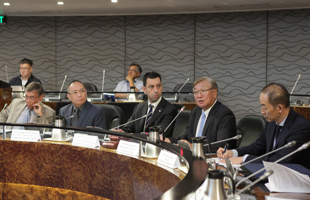
WHO/A. Esquillon
From 30 November to 11 December 2015, world leaders, climate change experts, representatives from the private sector and civil society organizations met in Paris to set a new standard for dealing with complex global problems posed by climate change. In all, 195 countries committed to limit the temperature increase to well below two degrees Celsius. This United Nations Conference of Parties on climate change, (COP 21) resulted in a major agreement and "a huge flame of hope."
But overcoming the challenges posed by an ever-changing environment to health continues to be of great significance. Climate change, stratospheric ozone depletion, loss of biodiversity, changes in hydrological systems and the supplies of freshwater, land degradation, urbanization and stresses on food-producing systems cause untold suffering to people across the globe.
It is in this context that Mr Kaveh Zahedi, UNEP Regional Director and Representative for Asia and the Pacific, Mr Emmanuel de Guzman, Secretary and Vice Chairperson of the Climate Change Commission of the Philippines, and Dr Wilfried Kreisel, former Health and Environment Executive Director at WHO headquarters, discussed the outcomes of COP 21 and the implications for the region during a forum at the Regional Office on 4 February 2016.
While welcoming the guest speakers to the forum, Dr Shin Young-soo, WHO Regional Director for the Western Pacific, said: "In December, the world came together in Paris to discuss and debate the future of our planet. After years of delay, we welcome this agreement and applaud governments all over the world for this historic achievement."
"The links between health and the environment are complex and wide-reaching. Environmental risk factors–such as unsafe water, inadequate sanitation, poor air quality, and toxic and hazardous waste exposure–are some of the most serious health threats facing us today. Climate change will only make them worse," he added.
According to the speakers, the Paris Climate Change Agreement contains six key elements:(1) agreement to limit global average temperature increase to below 2 degrees and to strive to limit to 1.5 degrees; (2) every 5 years, countries must strengthen climate actions; (3) enhanced transparency to ensure commitments are met; (4) climate financing to support developing countries; (5) long-term goal to achieve net zero emissions, and (6) adapting to help the world's most vulnerable. Mr Zahedi said that climate change is a major health risk multiplier, with existing impacts that are expected to increasingly affect human health. These include land degradation, biodiversity loss, reduced access to freshwater, and the increasing frequency and higher impact of natural disasters.
"The experience of Asia Pacific in the last four decades demonstrates the strong connection between climate change and the frequency and intensity of floods, storms, droughts and heat waves," said Mr Zahedi. "While natural disasters are on the rise worldwide, the Asia Pacific region has experienced some of the most damaging disasters in recent decades, with alarming consequences for human welfare."
Eight of the top 10 countries affected by natural disasters in the last decade are from the Asia Pacific: Afghanistan, China, India, Indonesia, Japan, Pakistan, the Philippines and Viet Nam. Total damage is estimated to be US$ 1.4 trillion, affecting 1.7 billion people and leaving 700 000 people dead over the past decade. Mr Zahedi said that due to changing climate and higher mobility of populations, "vectors and infectious diseases will spread."
Mr de Guzman said that the key to the COP 21 implementation is changing people's way of doing things and finding ways of funnelling the agreement's components to the grassroots level. He also underscored the need to make people understand the risks that climate change poses in order to change people's behaviours. He also urged everyone to act quickly, work together to decarbonize the world and achieve the goal of limiting temperature change to 1.5 degrees Celsius.
Climate change has always been high on WHO’s agenda, said Dr Kreisel. In 2007, WHO Director-General Dr Margaret Chan identified climate change as a top priority for the Organization. In 2008, WHO selected climate change as the theme for World Health Day, in recognition that climate change is posing increasing threats to global public health security. In 2015, a new work plan on climate change was unveiled which covers partnerships, awareness-raising, evidence-gathering and leading the public health response.
In October this year, the WHO regional offices for the Western Pacific and South-East Asia together with UNEP will again convene the Regional Forum on Environment and Health in Southeast and East Asian Countries. Since 2005 the forum has provided a platform for health and environment ministers from 14 Southeast and East Asian countries to meet and discuss pressing environmental issues that impact on health. It is an opportunity to share knowledge and experiences, promote collaboration and establish partnerships to address a myriad of issues such as air quality, safe water, sanitation and hygiene, solid and hazardous waste, toxic chemicals and hazardous substances, emergency preparedness, health impact assessment and climate change.
The forum's thematic working groups will examine the connections between climate change and health using tools such as the Integrated Environment and Health Assessment. The meeting likewise occurs at the dawn of the Sustainable Development Goals (SDGs) which includes several targets and indicators that directly refer to the environment.
